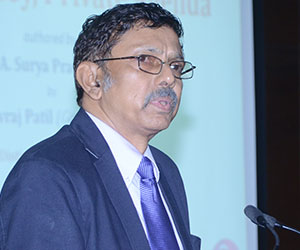The demand that voters should have the right to reject all the candidates in a constituency is now picking up with many non-government organizations and even the Election Commission supporting the idea. The proposal is to give electors the choice to press the button which says “None of the Above” if they do not like to vote for any of the candidates listed in the electronic voting machine. This option will come after the name of the last candidate in the voting machine.
The Election Commission first made this proposal in 2001. It also figured in the proposals made by the commission in regard to electoral reform in the year 2004 when Mr.T.S.Krishnamurthy was the Chief Election Commissioner (CEC). In those proposals the commission suggested several measures to check criminalization of politics and to improve transparency in regard to the antecedents of candidates via affidavits filed by them while filing nominations. The commission also had many other suggestions in regard to conduct of political parties and publication of exit polls.
In this set of recommendations which was forwarded by the C E C to the then Prime Minister, the Election Commission also expressed itself in favour of giving the voters the right to what is called negative or neutral voting. The commission said it had received proposals from a large number of individuals and organizations that voters must have the provision to reject all the candidates in a constituency, if they did not find any of them suitable. The commission noted that when the conventional ballot paper is used in an election, the voter can drop the ballot paper into the ballot box without marking his vote. However, no such provision is there in the electronic voting machines. Further, under Rule 49 ( o ) of the Conduct of Election Rules, 1961, a voter has the right to refuse to vote after he has been identified, his presence is marked in the register of electors and he is issued a ballot paper. However his decision not to vote does not remain a secret because polling officials and polling agents become aware of the voter’s decision. The Commission therefore recommended that the law be amended to specifically provide for negative or neutral voting. This can be done by amending Rules 22 and 49B of the Conduct of Election Rules, 1961 and adding a proviso that in the ballot paper which lists all the names of the candidates, there should be a column after the name of the last candidate which says “None of the Above”. This will enable a voter to reject all the candidates in the constituency. The Commission, while making this proposal in 2004 reminded the government that it had made a similar proposal earlier in December, 2001 and that a petition filed by the People’s Union for Civil Liberties seeking such a provision was pending before the Supreme Court. This case came up a year ago in the Supreme Court before a two-judge Bench and the Bench decided to refer this matter to a five-judge Bench. The court referred to earlier judgements of the court which recognized the voters’ right to information in regard to the assets and criminal past of candidates and said that this had given a new dimension to the conduct of free and fair elections.
The court said "These judgments also gave an expansive meaning to the term `expression' used in Article 19(1) (a) by declaring that in the democratic set-up of our country, the electors' right to have complete information about the candidates and then express his choice for a particular person, are necessary concomitant of the freedom of expression guaranteed under Article 19(1) (a)." The Election Commission, which had made this proposal way back in 2001, supported the petitioner but the union government wanted the petition dismissed. A larger Constitutional Bench will now hear this case.
During the arguments, Mr.Rajinder Sachar, who appeared for the Petitioner, said Rule 17A in the Conduct of Election Rules says that “Elector deciding not to vote. — If an elector, after his electoral roll number has been duly entered in the register of voters in Form 17A and has put his signature or thumb impression thereon as required under sub-rule (1) of rule 49L, decided not to record his vote, a remark to this effect shall be made against the said entry in Form 17A by the presiding officer and the signature or thumb impression of the elector shall be obtained against such remark.” He said this violated Article 19 1 (a) of the Constitution relating to freedom of speech and expression.
More recently, National Election Watch (NEW), a nationwide campaign comprising of more than 1200 NGOs and other citizen led organizations, which is working on electoral reforms and democracy and governance-related issues has demanded that the electronic voting machine must have a button which says “None of the Above”. It has said that
when a provision is made for “None of the Above” – which would give people the option not to vote for any candidate if they do not like any of the contesting candidates.
If the “None of the Above” option gets maximum votes, it would mean that all the
contesting candidates have been rejected by the voters. If this happens, National Election Watch wants a re-election to be held in which none of the previous contestants should be allowed to contest again.
The movement to effect this reform is now really catching up in the country. However, since the Supreme Court is looking into this issue, one will have to wait until this case is decided.










Post new comment